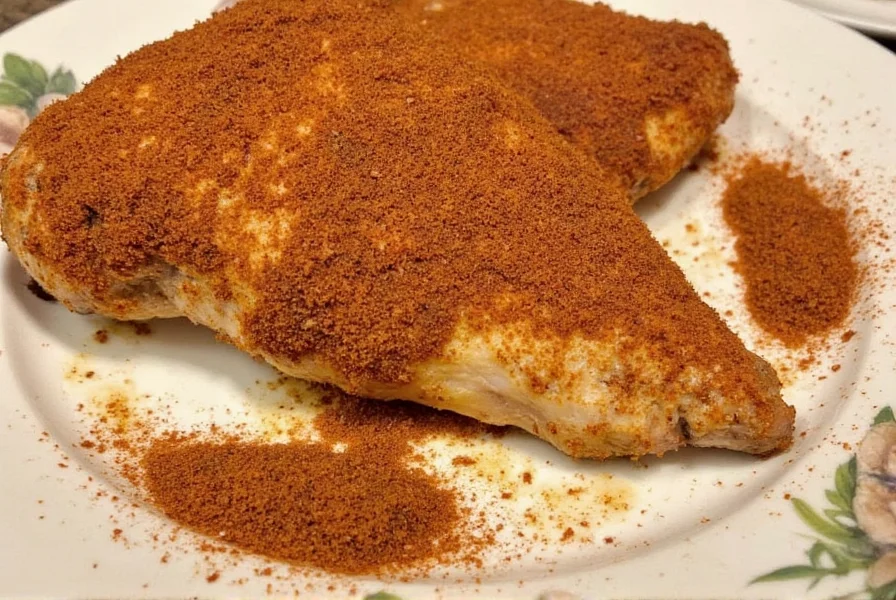Table of Contents
- Top 7 Seasonings That Pair Perfectly with Chicken
- Science-Backed Flavor Pairings for Chicken
- Professional Marinating Guide: Times and Ratios
- Seasoning Adjustments for Different Cooking Methods
- Chef-Recommended Seasoning Combinations
- Troubleshooting Common Seasoning Mistakes
- Frequently Asked Questions About Chicken Seasoning
Top 7 Seasonings That Pair Perfectly with Chicken
The most scientifically supported seasonings that enhance chicken's natural flavor are garlic powder, smoked paprika, thyme, rosemary, lemon zest, onion powder, and black pepper. These create a balanced flavor profile that complements chicken's mild taste without overpowering it. For optimal results, combine 1 teaspoon garlic powder, 1 teaspoon smoked paprika, ½ teaspoon black pepper, and ½ teaspoon each of dried thyme and rosemary per pound of chicken. This foundational blend works across most cooking methods and provides both depth and brightness that highlights chicken's natural qualities.
Science-Backed Flavor Pairings for Chicken
Understanding the flavor chemistry behind successful pairings helps create consistently delicious chicken dishes. Chicken contains glutamates that respond well to umami-enhancing ingredients, while its mild flavor profile serves as an ideal canvas for complementary flavors.
1. Umami Powerhouses
Garlic, onion, and smoked paprika contain compounds that synergize with chicken's natural glutamates. When garlic is crushed, it releases allicin which creates complex flavor compounds when heated. Smoked paprika contributes guaiacol, which adds depth without overwhelming chicken's delicate flavor.
2. Herbaceous Pairings
Thyme and rosemary contain thymol and rosmarinic acid, which complement poultry without creating bitter notes. These hardy herbs maintain their structure during cooking, releasing flavor gradually. Use 1 teaspoon dried thyme or 1 tablespoon fresh thyme per pound of chicken for optimal flavor development.
3. Acidic Balancers
Lemon zest (not just juice) contains limonene, which cuts through richness while enhancing other flavors. Add zest during the last 5 minutes of cooking to preserve volatile compounds that provide bright, fresh notes without making the dish taste sour.
4. Warm Spices
Cumin and coriander work surprisingly well with chicken despite being associated with other proteins. Their terpene compounds create a warm base note that supports chicken's flavor rather than competing with it. Use sparingly (¼-½ teaspoon per pound) to avoid overwhelming the dish.
Professional Marinating Guide: Times and Ratios
Proper marinating technique transforms chicken from bland to extraordinary. The optimal marinating time depends on cut thickness and acid content:
| Chicken Cut | Marinating Time | Acid Ratio (per pound) | Salt Ratio (per pound) | Oil Ratio (per pound) |
|---|---|---|---|---|
| Boneless breasts | 30-60 minutes | 1 tbsp citrus or vinegar | ¾ tsp kosher salt | 2 tbsp neutral oil |
| Bone-in thighs | 2-4 hours | 1.5 tbsp citrus or vinegar | 1 tsp kosher salt | 3 tbsp neutral oil |
| Whole chicken | 8-12 hours | 3 tbsp citrus or vinegar | 1.5 tsp kosher salt | ¼ cup neutral oil |
| Wings/drumettes | 1-2 hours | 1 tbsp citrus or vinegar | ½ tsp kosher salt | 1.5 tbsp neutral oil |
Exceeding these times causes protein breakdown that results in mushy texture. Always marinate in the refrigerator, not at room temperature. For maximum flavor penetration, make shallow diagonal cuts (¼ inch deep) across the chicken surface before marinating.
Seasoning Adjustments for Different Cooking Methods
Each cooking technique requires specific seasoning approaches to prevent burning or flavor loss:
- Grilling (direct heat): Avoid sugar-containing seasonings that will burn. Double the amount of smoked paprika (which withstands high heat) and reduce fresh herbs by half. Apply oil-based rubs 15 minutes before grilling to create a protective layer.
- Oven roasting: Use a higher proportion of dried herbs (which concentrate during cooking). Add 25% more thyme and rosemary than you would for other methods. Place lemon slices directly on chicken during the last 20 minutes for controlled acidity.
- Pan-searing: Use half the normal salt amount initially (add more after cooking), as salt draws out moisture that prevents proper browning. Add garlic powder after the chicken has developed a crust to prevent burning.
- Sous vide: Reduce salt by 30% since flavors concentrate in the bag. Increase aromatic herbs by 50% as their volatile compounds don't evaporate. Add finishing acids (lemon/vinegar) after cooking.
- Air frying: Create a dry rub with cornstarch (1 tsp per pound) to help seasonings adhere during the rapid air circulation. Double the black pepper as its piperine compounds withstand high heat better than delicate herbs.
Chef-Recommended Seasoning Combinations
Professional kitchens use these proven combinations for restaurant-quality results:
Mediterranean Master Blend
2 tsp dried oregano + 1.5 tsp garlic powder + 1 tsp lemon zest + ½ tsp red pepper flakes + 1 tsp dried mint. Ideal for grilled chicken, this blend leverages the synergistic effect between oregano's carvacrol and lemon's limonene for maximum aroma release.
Smoky BBQ Rub
2 tbsp smoked paprika + 1 tbsp brown sugar + 1 tsp chipotle powder + 1.5 tsp garlic powder + 1 tsp onion powder + ½ tsp cumin. The key is using smoked (not sweet) paprika and adding sugar only during the last 10 minutes of cooking to prevent burning.
French Herb Infusion
2 tbsp fresh tarragon + 1.5 tbsp fresh chives + 1 tbsp fresh parsley + 2 minced shallots + 3 tbsp Dijon mustard + 2 tbsp white wine vinegar. This combination uses the allicin from shallots to enhance the thujone in tarragon, creating complex flavor compounds that develop during cooking.
Asian Fusion Marinade
3 tbsp soy sauce + 2 tbsp rice vinegar + 1 tbsp sesame oil + 1.5 tbsp fresh ginger + 2 minced garlic cloves + 1 tbsp honey. The enzymatic action of fresh ginger breaks down proteins gently while the glutamates in soy sauce enhance chicken's natural umami.
Troubleshooting Common Seasoning Mistakes
Fix these common seasoning issues with professional solutions:
- Overly salty chicken: If already cooked, serve with unsalted starchy sides (potatoes, rice) that absorb excess salt. For future dishes, use 25% less salt and compensate with umami boosters like tomato paste or mushrooms.
- Burnt spices on grilled chicken: Create a two-stage seasoning approach - apply heat-sensitive spices (garlic, onion) after cooking, and use only heat-stable spices (paprika, cumin) during cooking.
- Flavorless marinade: Add 1 tsp mustard powder to help emulsify the marinade and improve flavor penetration. The mucilage in mustard helps ingredients adhere to the chicken surface.
- Uneven seasoning distribution: Use a spray bottle with oil-based seasoning mix for even coverage, especially on irregular surfaces like wings or bone-in pieces.
- Mushy texture from marinating: Limit acid content to no more than 1.5 tbsp per pound and never marinate more than 12 hours. For quick flavor penetration, use a marinade injector for thicker cuts.
Frequently Asked Questions About Chicken Seasoning
What is the scientific reason certain seasonings pair well with chicken?
Chicken contains high levels of glutamic acid and inosinic acid, which create umami compounds when combined with specific seasonings. Garlic's allicin reacts with chicken proteins to form new flavor compounds during cooking. Rosemary and thyme contain volatile compounds that complement rather than compete with chicken's delicate flavor profile. Scientifically, the most successful pairings share molecular compounds that create flavor synergy - for example, lemon zest contains limonene which enhances the perception of other flavors without adding sourness.
How do professional chefs determine seasoning ratios?
Professional chefs use the 60-30-10 rule for seasoning balance: 60% base flavors (salt, pepper, garlic), 30% supporting flavors (herbs, mild spices), and 10% accent flavors (acid, heat, unique elements). They also consider the Maillard reaction - adjusting seasoning based on how cooking method affects flavor development. Most importantly, they season in stages: 30% in the marinade, 50% during cooking, and 20% as a finishing touch. This layered approach creates depth that single-application seasoning cannot achieve.
Why does my seasoning rub not stick to chicken?
Seasoning rubs need moisture to adhere properly. Pat chicken completely dry, then apply a thin layer of neutral oil (about 1 tsp per pound) before adding dry rub. For better adhesion, include 10% cornstarch in your dry rub mixture - it helps the seasoning stick without creating a paste. Alternatively, make a wet paste by mixing dry spices with oil or mustard before application. Never apply dry rub to wet chicken, as this causes seasoning to slide off during cooking.
What's the difference between using fresh versus dried herbs with chicken?
Fresh herbs contain higher levels of volatile aromatic compounds but lose these quickly when heated. They're best added in the last 5-10 minutes of cooking or as a garnish. Dried herbs have concentrated non-volatile compounds that withstand longer cooking times. The general conversion is 3 parts fresh to 1 part dried, but this varies by herb - hardy herbs like rosemary and thyme dry well, while delicate herbs like basil and cilantro lose most flavor when dried. For maximum impact, use dried herbs early in cooking and fresh herbs at the end.
How can I create restaurant-quality seasoning blends at home?
Professional seasoning blends balance six key elements: salt (for flavor enhancement), sweet (to balance acidity), acid (for brightness), heat (for complexity), umami (for depth), and aromatic compounds (for fragrance). Start with a base of 4 parts salt to 1 part sugar, then add 2 parts garlic powder, 1.5 parts onion powder, 1 part paprika, and 0.5 parts black pepper. For specific profiles, add supporting elements: lemon zest for Mediterranean, smoked paprika for BBQ, or five-spice powder for Asian. Toast whole spices before grinding for maximum flavor release, and always store blends in airtight containers away from light.
What are the most common seasoning mistakes home cooks make with chicken?
The top five mistakes are: 1) Not accounting for cooking method (using sugar-based rubs for direct grilling), 2) Over-marinating with acidic components causing mushy texture, 3) Applying all seasoning at once rather than in stages, 4) Using improper fresh-to-dried herb ratios, and 5) Not adjusting for chicken cut thickness (using the same seasoning amount for breasts and wings). Professional chefs avoid these by understanding flavor chemistry principles and adjusting their approach based on specific cooking variables.












 浙公网安备
33010002000092号
浙公网安备
33010002000092号 浙B2-20120091-4
浙B2-20120091-4